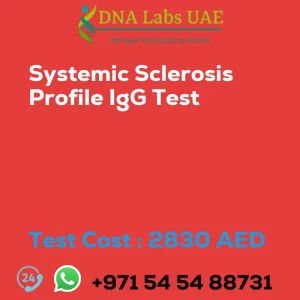MULTIPLE SCLEROSIS PANEL 2 Test
Test Cost: AED 2750.0
Symptoms, Diagnosis, and Test Details
The Multiple Sclerosis Panel 2 test is a diagnostic tool used to help identify and monitor multiple sclerosis (MS), a chronic autoimmune disease that affects the central nervous system. This panel includes several tests that assess different aspects of MS and its progression.
Test Components:
- IgG Synthesis Index & Rate
- Oligoclonal Bands, CSF & Serum
- Myelin Basic Protein, CSF (Code RW135)
Price: 2750.0 AED
Sample Condition:
4 mL (3 mL min.) CSF in a sterile screw capped container AND 2 mL (1 mL min.) serum from 1 SST. Ship refrigerated. DO NOT FREEZE. Ideally serum & CSF should be tested simultaneously. Strictly adhere to CSF specimen volumes.
Report Delivery:
LPL: Sample Daily by 9 am; Report Next day
USA: Sample by 7th of the Month; Report after 2-3 weeks.
Method:
BCG, Nephelometry, Immunoturbidimetry, Isoelectric Focusing, RIA
Test Type: Multiple Sclerosis
Doctor: Neurologist
Test Department:
Pre Test Information: Ideally serum & CSF should be tested simultaneously. Strictly adhere to CSF specimen volumes.
Test Details:
The Multiple Sclerosis Panel 2 test is a diagnostic tool used to help identify and monitor multiple sclerosis (MS), a chronic autoimmune disease that affects the central nervous system. This panel includes several tests that assess different aspects of MS and its progression.
- Magnetic Resonance Imaging (MRI): This imaging test uses powerful magnets and radio waves to create detailed images of the brain and spinal cord. It can help detect the presence of lesions or areas of inflammation that are characteristic of MS.
- Cerebrospinal Fluid Analysis: A sample of cerebrospinal fluid, which surrounds the brain and spinal cord, is collected through a lumbar puncture (spinal tap). The fluid is then analyzed for the presence of specific markers, such as oligoclonal bands and increased immunoglobulin G (IgG) levels, which can indicate MS.
- Visual Evoked Potential (VEP) Test: This test measures the electrical activity of the visual pathway in response to visual stimuli. It helps assess the integrity of the optic nerves, which are commonly affected in MS.
- Blood Tests: Blood samples may be taken to measure various markers associated with MS, such as antibodies against myelin, a protective covering of nerve fibers that is damaged in MS.
- Neurological Examination: A comprehensive assessment of neurological function is conducted by a healthcare professional. This may include evaluating muscle strength, coordination, reflexes, sensory perception, and other neurological signs.
The Multiple Sclerosis Panel 2 test is typically ordered by a neurologist or other healthcare provider when MS is suspected or needs to be monitored. It can help confirm the diagnosis, assess disease activity, and guide treatment decisions. The results of these tests, in conjunction with the patient’s symptoms and medical history, can provide valuable information for managing MS.
| Test Name | MULTIPLE SCLEROSIS PANEL 2 Test |
|---|---|
| Components | *IgG Synthesis Index& Rate*Oligoclonal Bands, CSF & Serum*Myelin Basic Protein, CSF (Code RW135) |
| Price | 2750.0 AED |
| Sample Condition | 4 mL (3 mL min.) CSF in a sterile screw capped container AND 2 mL (1 mL min.) serum from 1 SST. Ship refrigerated. DO NOT FREEZE. Ideally serum & CSF should be tested simultaneously. Strictly adhere to CSF specimen volumes. |
| Report Delivery | LPL: Sample Daily by 9 am; Report Next day USA: Sample by 7th of the Month; Report after 2??3 weeks. |
| Method | BCG, Nephelometry, Immunoturbidimetry, Isoelectric Focusing, RIA |
| Test type | Multiple Sclerosis |
| Doctor | Neurologist |
| Test Department: | |
| Pre Test Information | Ideally serum & CSF should be tested simultaneously. Strictly adhere to CSF specimen volumes. |
| Test Details |
The Multiple Sclerosis Panel 2 test is a diagnostic tool used to help identify and monitor multiple sclerosis (MS), a chronic autoimmune disease that affects the central nervous system. This panel includes several tests that assess different aspects of MS and its progression. 1. Magnetic Resonance Imaging (MRI): This imaging test uses powerful magnets and radio waves to create detailed images of the brain and spinal cord. It can help detect the presence of lesions or areas of inflammation that are characteristic of MS. 2. Cerebrospinal Fluid Analysis: A sample of cerebrospinal fluid, which surrounds the brain and spinal cord, is collected through a lumbar puncture (spinal tap). The fluid is then analyzed for the presence of specific markers, such as oligoclonal bands and increased immunoglobulin G (IgG) levels, which can indicate MS. 3. Visual Evoked Potential (VEP) Test: This test measures the electrical activity of the visual pathway in response to visual stimuli. It helps assess the integrity of the optic nerves, which are commonly affected in MS. 4. Blood Tests: Blood samples may be taken to measure various markers associated with MS, such as antibodies against myelin, a protective covering of nerve fibers that is damaged in MS. 5. Neurological Examination: A comprehensive assessment of neurological function is conducted by a healthcare professional. This may include evaluating muscle strength, coordination, reflexes, sensory perception, and other neurological signs. The Multiple Sclerosis Panel 2 test is typically ordered by a neurologist or other healthcare provider when MS is suspected or needs to be monitored. It can help confirm the diagnosis, assess disease activity, and guide treatment decisions. The results of these tests, in conjunction with the patient’s symptoms and medical history, can provide valuable information for managing MS. |








